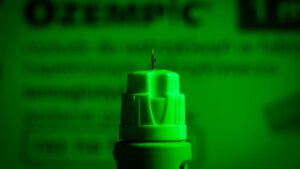Cheaper versions of the “gamechanger” HIV prevention drug lenacapavir are to be made available in 120 low- and middle-income countries, manufacturer Gilead Sciences has announced.
However, campaigners said the deal “abandons” many countries with a high HIV burden, particularly in Latin America, and called for transparency on exact prices.
Lenacapavir, given as a twice-yearly injection, has shown strong results for HIV prevention. It stopped infection in a trial involving girls and women in South Africa and Uganda, and provided almost complete protection in a second trial involving mainly men across Argentina, Brazil, Mexico, Peru, South Africa, Thailand and the US.
Gilead faced pressure to make lenacapavir available worldwide as soon as possible and as cheaply as possible. Already approved as a treatment for HIV, it is sold in the US under the name Sunleca for $42,250 a year. Researchers says it can be produced profitably for just $40 (£30) per patient, per year.
The company said it has signed agreements with six manufacturers to make and sell generic lenacapavir in 120 “high-incidence, resource-limited” countries. These are mainly lower-income countries.
It said it will also bridge the gap until those manufacturers are up and running by providing products supplied by Gilead, which is prioritizing registration in 18 countries with high HIV rates, including Botswana, South Africa and Thailand.
However, Dr Mohga Kamal-Yanni, co-leader for the People’s Medicines Alliance, criticized the decision to arrange licenses directly rather than through the UN-backed Medicines Patent Pool. The deals came with “draconian conditions” that could make it harder for people in excluded countries to get hold of the drug, she said.
“Behind the seemingly large numbers of countries included in the license, Gilead is largely leaving out upper middle-income countries, where new infections are highest, with almost all of Latin America left out,” she said.
“The excluded countries can use their legal rights to overcome intellectual property restrictions with a compulsory license. However, Gilead’s agreement prevents the six licensee companies from selling to those countries. Moreover, this route is fraught with difficulties and may face legal challenges from the industry. But it is a country’s right, and must be used if necessary.”
Winnie Byanyima, UNAids’ executive director, said: “Lenacapavir, which only requires two injections a year, could be a game-changer – if everyone who would benefit from it could access it.
“We applaud Gilead for licensing the medicine without waiting for registration, which should be the norm. We are fighting a pandemic and the speed at which generic versions come to market will determine whether these medicines can be truly transformative.”
Byanyima warned that 41% of new infections were in upper middle-income countries, and excluding them from the licenses “is deeply worrying and undermines the potential of this scientific breakthrough”.
She said UNAids is also still waiting for a specific price and full transparency about Gilead’s costs.
The generic manufacturers are India’s Dr Reddy’s Laboratories, Emcure Pharmaceuticals and Hetero Labs, as well as US-based Viatris unit Mylan, Egypt’s Eva Pharma and Pakistan-based Ferozsons Laboratories. UNAids said they would also like to see agreements in countries with high HIV rates such as South Africa.
Gilead said it will begin applying for global regulatory approval for lenacapavir as an HIV prevention regimen by the end of this year.






